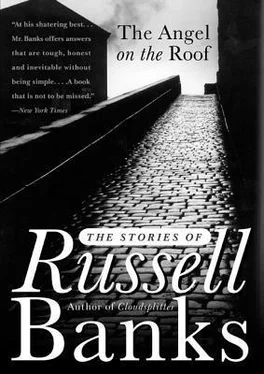So far as fishing went, winter or summer, Skitter Lake was Merle’s. Three sides of the lake adjoined the Skitter Lake State Forest, which made it fairly inaccessible from the road, except through the trailerpark, and people, strangers especially, were reluctant to drive through the trailerpark and stop their cars before the short, sandy beach at the end of the peninsula, get out their gear, launch their boats, canoes, or bob-houses, and commence fishing. It was a little too public, and also a little too private, as if the trailerpark were actually a boardinghouse with all the tenants watching you cross their shared front yard to get to their shared fishing place. The same went for ice skating and swimming. The residents of the trailerpark skated and swam Skitter Lake, but other people went elsewhere, which wasn’t much of an inconvenience, since in town there was the mill pond, and throughout the surrounding countryside there were dozens of small, accessible ponds and lakes where the fishing was as good as, if not better than, the fishing at Skitter Lake.
As a result, when Merle decided at the end of the first week in December that the ice was thick enough to support the weight of his bob-house, he made the decision alone. He couldn’t wait until someone less cautious or patient than he had dragged his bob-house safely out to the middle of the lake. He couldn’t wait until schoolboys from town, eager to play hockey, had crossed and crisscrossed the lake a dozen times the way they did down at the millpond, whacking the ice with hockey sticks and listening to the cracks and fault lines race away from the blow, rather than down, revealing in that way that the ice was now thick enough to support the weight of large human beings.
Merle took his long-handled chisel in hand and, tapping lightly in front of him as he walked, moved like a blind man carefully onto the ice. He walked twenty or so feet from the shore and parallel to the shore toward the marshy area west of the park, where the hermit they called the Guinea Pig Lady had built her shack. Here, he knew, the water was late to freeze, because of the several trickling inlets and the marsh grass and bushes, and here, too, the water was not very deep, so that if, indeed, it was not safe and he fell through, he would not be in any danger. It was late in the day, and the sky was peach-colored near the horizon and blue-gray where thin clouds had scudded in from the northeast. Merle, in his dark green mackinaw and plaid trooper’s cap with the fur earflaps tied down, tapped his way away from the trailerpark toward the swamp, then past the swamp and out along the point, crossing the cove, and then beyond the point, until he was over deep water. Below him, the lake was a hundred feet deep, and the ice was black and smooth, like polished obsidian. This first solitary walk on the ice is almost like flying. You leave the safe and solid earth and move over what you know and can see is an ether, supported by a membrane that you can feel, but cannot quite see, as if the difference between the ice below and the air above were merely a difference in atmospheric pressures. Later, your mind will accept the information coming from your body, and then there will be no difference between ice with a hundred feet of water below it and the frozen ground itself, so that when you cut a hole in the ice, and it fills with water, you will be surprised, but no more frightened than if you had dug a hole in sand at the beach and watched it fill with water.
Confident now that he could safely put his bob-house onto the ice, Merle spent the following day picking through the brushy, overgrown fields out by Old Road, collecting galls from dried stalks of goldenrod. Inside each gall slept a small, white grub, excellent bait for bluegills, and it wasn’t long before Merle had collected in his mackinaw pockets half a hundred of the woody containers. On returning to the trailerpark, he was hailed on the roadway just opposite Marcelle Chagnon’s trailer by Bruce Severance. Bruce drove his black Chevy van with the Rocky Mountain sunsets on the sides up behind the old man — it was midafternoon, but almost dark, and he probably hadn’t seen Merle until he was almost upon him. He stopped a few feet away, raced his motor until Merle turned, then waved him over to the driver’s side and cranked down the window.
“Hey, man, what’s happening?” The sweet smell of marijuana exhaled from the vehicle, and the kid took a last hit, knocked the lit end off the roach, and popped it into his mouth.
“Temperature’s dropping,” Merle said with a slight smile. He peered up at the boy, and his blue, crinkly-lidded eyes filled and glistened in the wind.
“Yeah. Wow. Temperature’s dropping. That’s what’s happening, all right.” Bruce swallowed the roach.
“Yep.” Merle turned to walk on.
“I’ve been meaning to ask you, man, I saw you this morning, when I came in from Boston, you were in those old fields out by the road. Then later I came back out, and you were still there. And now here you are again, this time coming in from the fields. What’s going on out there, man?”
“Nothing. Temperature’s dropping there, too. That’s all.”
“No, man. I’m curious. I know you know things, about herbs and things, I mean.”
Merle said, “You want to know what I was out there for? Is that what you’re wondering, boy?”
“Yeah.”
The old man reached into his mackinaw pocket and drew out one of the goldenrod galls. “These.”
“What’s that?”
“Goldenrod gall.”
“What’s it for, man?”
“I’ll show you. But you’ll have to spend a while first, helping me move my bob-house out on the ice tonight.”
“Tonight? In the dark?”
“Yep. Got to bait the camp with chum tonight, so’s I can start to fish tomorrow.”
With a slow and maybe reluctant nod, the kid agreed to help him. Merle walked around and climbed into the van, and the two drove through the park to Merle’s trailer.
When an old man and a young man work together, it can make an ugly sight or a pretty one, depending on who’s in charge. If the young man’s in charge or won’t let the old man take over, the young man’s brute strength becomes destructive and inefficient, and the old man’s intelligence, out of frustration, grows cruel and inefficient. Sometimes the old man forgets that he is old and tries to compete with the young man’s strength, and then it’s a sad sight. Or the young man forgets that he is young and argues with the old man about how to do the work, and that’s a sad sight, too.
In this case, however, the young man and the old man worked well together. Merle told Bruce where to place his pole so he could lift the front of the bob-house, while Merle slid a second pole underneath. The same at the back, until, practically on its own, the bob-house started to roll down the slope toward the ice. As each roller emerged from the back, Merle told Bruce to grab it and run around to the front and lay it down, which the young man did, quickly and without stumbling, until, in a few moments, the structure was sliding onto the ice, and then it was free of the ground altogether. It slid a few feet from the bank, and the momentum left it, and it stopped, silent, solid, dark in the wind off the lake.
“Incredible!” the kid said.
“Everything’s in the bob-house except firewood,” Merle said. “Put them poles inside, we’ll cut them up out on the lake.”
The kid did as he was told.
Merle walked around to the front of the bob-house, away from the land, and took up a length of rope tied to a quarter-inch-thick U-bolt. “I’ll steer, you push,” he called to the kid.
“Don’t you have a flashlight?” Bruce yelled nervously. The wind was building and shoved noisily against the bob-house.
Читать дальше












